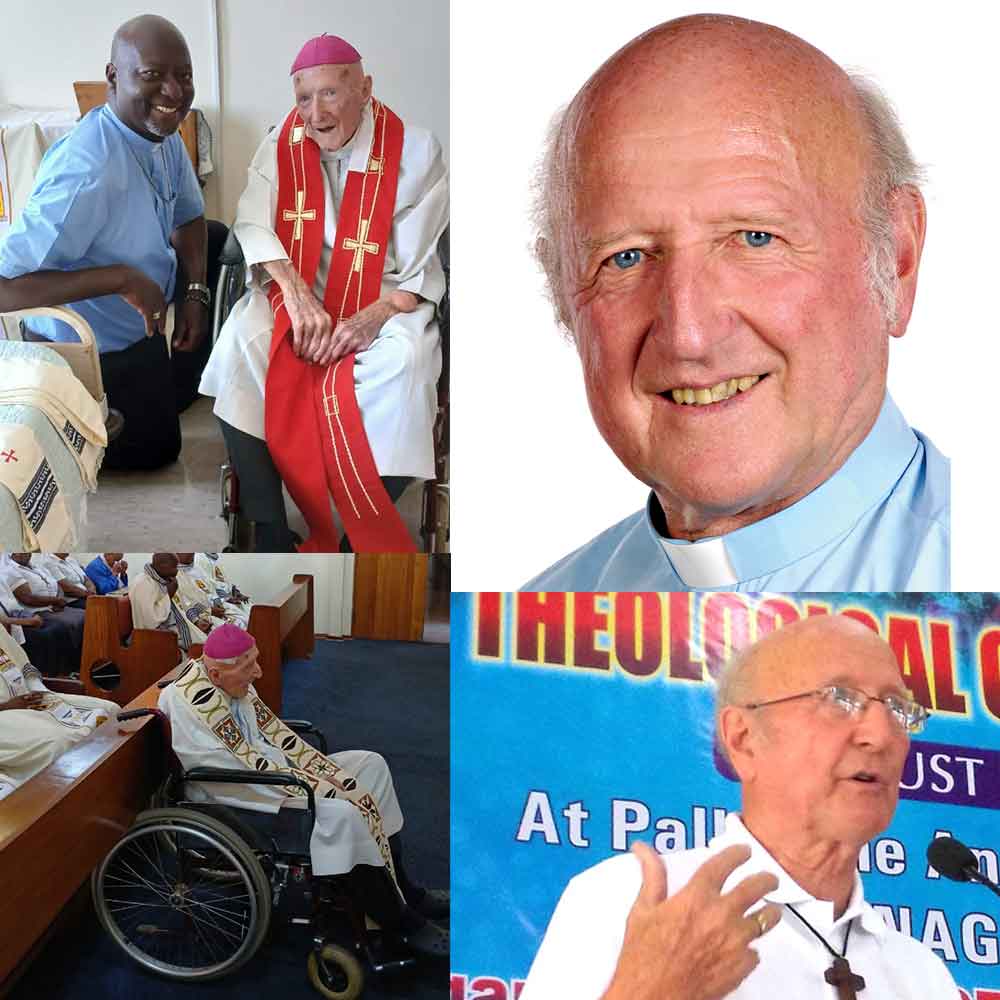Bishop Fritz Lobinger, Rest in Peace
 Bishop emeritus Fritz Lobinger of Aliwal North, who died on August 3 at the age of 96, was a groundbreaking missionary from Germany whose lifelong ministry in South Africa shaped a new vision of a participatory Church rooted in local culture and leadership — long before Pope Francis revived the philosophy of a synodal Church.
Bishop emeritus Fritz Lobinger of Aliwal North, who died on August 3 at the age of 96, was a groundbreaking missionary from Germany whose lifelong ministry in South Africa shaped a new vision of a participatory Church rooted in local culture and leadership — long before Pope Francis revived the philosophy of a synodal Church.
The requiem of the retired bishop will be held on August 15 in Sacred Heart Cathedral in Aliwal North, Eastern Cape.
Born on January 22, 1929 in Passau, Bavaria, Lobinger studied for the priesthood at the seminary in Regensburg, where he became close friends with Oswald Hirmer and Hubert Bucher. In response to Pope Pius XII’s call for Fidei Donum priests — missionaries from the diocesan priesthood, rather than from religious orders — the three petitioned to serve in South Africa.
Lobinger was ordained in June 1955 and arrived in Aliwal North in 1956, followed by Hirmer in 1957 and Bucher in 1958. Each ultimately became a bishop: Bucher of Bethlehem in 1977, and Hirmer of Mthatha in 1997.
Life in South Africa
As a priest in Aliwal North, Fr Lobinger immersed himself in the Xhosa language and community life, earning the honourary name umGcina (“The Keeper”).
Serving first at Tafila parish, he went on to collaborate with Hirmer and Bucher at the Lumko Missiological Institute to train catechists and develop pastoral outreach programmes. He earned a doctorate in theology in 1986 from the University of Münster, Germany.
Appointed apostolic administrator of Aliwal North in December 1986 and consecrated bishop in February 1987, Bishop Lobinger led Aliwal through a period of rapid growth. He pioneered translation and inculturation. When he was involved in the translation of the Xhosa missal, Lobinger saw this as an opportunity for meaningful inculturation.
He championed Small Christian Communities, trained lay leaders through workshops, and supported women and youth as agents of change.
A prolific writer and thinker, Lobinger authored dozens of training manuals, articles and books, in English and German. He began his writing career in 1963 with Africa’s Way to Life, a catechism co-authored with Hirmer. Drawing on their experiences of African culture, it was created specifically to instruct adult baptismal candidates.
His 1998 study on the viri probati model — ordaining married, proven laymen to the priesthood in remote communities without regular access to the sacraments — became influential. When Pope Francis revived that discussion at the 2019 Synod on the Amazon, he explicitly cited Bishop Lobinger’s research.
His Legacy
Bishop Lobinger’s commitment to justice was evident during apartheid. He encouraged clergy and laity to resist racial injustice, to broker reconciliation, and to advocate for a non-racist Church. He refused to appoint priests along racial lines and later worked to educate voters in the post-apartheid society.
Under his leadership, the diocese of Aliwal implemented community development schemes — including building 350 houses for poor families — and care projects for HIV/Aids patients. He formed Diocesan Pastoral Councils that included laypeople, launched Community Weeks, and empowered local churches with participatory governance.
His episcopal motto, “But all of you are brothers and sisters”, reflected his conviction that Church must reflect kinship, dialogue and inclusion. He mentored generations of clergy, catechists, and laity, believing that lay leadership — not clericalism — would preserve vibrant South African Christianity.
His respect and regard for the people was evident in the consultative approach he took when introducing the bishops’ 1989 Pastoral Plan, “Community Serving Humanity”, shortly after his episcopal ordination. To gain acceptance for significant changes, he developed meeting formats and methods that can be seen as genuine synodal processes — more than 30 years before Pope Francis launched the Synod on Synodality, which concluded last October.
Bishop Lobinger retired as bishop of Aliwal North in 2004. Physically active until late in life, he was a keen swimmer, climber and windsurfer, and famously balanced on high dam crests, undaunted by heights or risk.
He was the subject of a profile feature in The Southern Cross’ January 2025 issue, and Bishop Joe Kizito’s tribute featured on this site in October 2024.
Bishop Lobinger remained close to his companions. In a 2021 email to his friend Hubert Bucher (just before his friend’s death), he wrote in their Bavarian dialect: “Mia dadns wiada!” (“We would do it again!”) — referring to their shared missionary vocation.
Now Bishop Lobinger, who lived his retirement years out in Mariannhill, has joined his two old friends Oswald Hirmer, who died in 2011 at the age of 81, and Bucher, who died in 2021 at 90, in their eternal rest.
- Be Persistent in Prayer: 29th Sunday in Ordinary Time - October 17, 2025
- St Luke Prayer - October 15, 2025
- The Concept and Tasks of Papal Diplomacy - October 14, 2025





